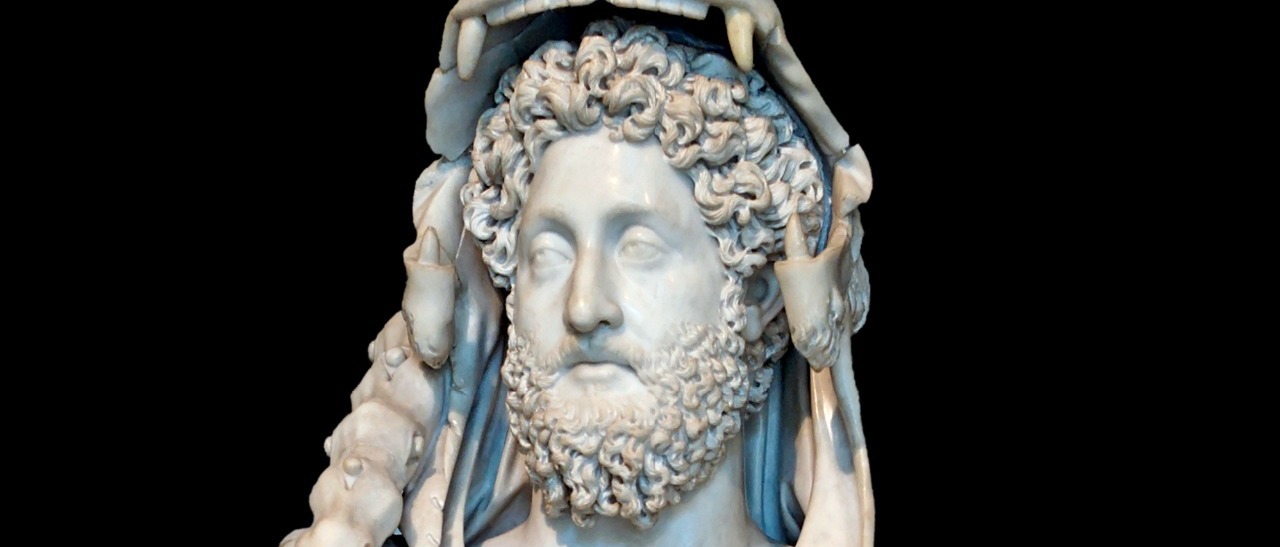Emperor Commodus
Posted on 26th December 2020
Born 31 August 161AD to the reigning emperor Marcus Aurelius, he was the tenth of fourteen children, but the only son to live to adulthood; he therefore became the heir to his father.
In early life he was cared for by his father’s doctor Galen, in order to keep him fit and healthy. He was also given an extensive education with many tutors.
As a child he travelled with his father on many of his military crusades, accompanying him during the Marcomannic wars in 172AD and to the Eastern Provinces in 175AD, then returning to Rome in the autumn of 176AD.
On 27 November 176AD Commodus was granted the rank of Imperator, then in 177AD his father gave him the title Augustus. Commodus and Marcus Aurelius became joint rulers, holding a joint triumph on 23 December of the same year.
On 1 January 177AD fifteen year-old Commodus became consul for the first time, then in the summer of 178AD aged sixteen, he committed to an arranged marriage with Bruttia Crispina. This was not believed to be a happy marriage and did not produce any children. Commodus banished his wife to the island of Capri in 188AD and later had her executed.
In 178AD Commodus accompanied his father to the Danubian front where Marcus Aurelius died on 17 March 180AD.
Emperor – 180AD – 192AD
Commodus became emperor following his father’s death. Much of Marcus Aurelius’ reign had been tarnished by warfare, but Commodus’ reign was much quieter, military speaking, but caused great political problems as he did not have a good relationship with the senate.
Observer at the time, Dio Cassius, remarked about Commodus’ rule ‘From a kingdom of gold to one of iron and rust’. Many historians believe Commodus’ reign to be ‘The decline of the Roman Empire’.
Much of Commodus’ reign is undocumented, however he is believed to have been easily influenced by others and left much of the duties of government to others.
Commodus suffered from odd and paranoid behaviour; he believed himself to be the reincarnation of Hercules, and ordered the people to call him Hercules. He had many statues of himself dressed as Hercules, built in Rome.
While others were left to govern Rome, Commodus was engaging in gladiatorial combat, fighting people and animals in the arena. These were not fair fights as many of the people were crippled and could not defend themselves. He also travelled extensively to partake in private combats and chariot races.
Commodus was unpopular and over time there were many attempts on his life, even by his own family. His sister Lucilla arranged two men to murder Commodus in 182AD, but they failed and were executed by the emperor’s bodyguard, Lucilla was also later killed
Due to his paranoia and the attempts on his life, Commodus rarely appeared in public.
In 192AD Commodus held the Plebian Games, though only for his own gratification in showing the people his skill and strength. Using arrows and javelins he would kill hundreds of animals each morning, then in the afternoons he would fight as a gladiator. He was successful in all his fights as nobody dare try to beat him.
The attempts on Commodus’ life continued. On 31 December 192AD his food was poisoned, but he survived by vomiting up the poison. Finally, determined to kill him, his conspirators sent his wrestling partner Narcissus to strangle him in his bath, and in this they succeeded.
On his death the senate declared him ‘a public enemy’.
Tagged as: Junior Ancient Rome
Share this post:





